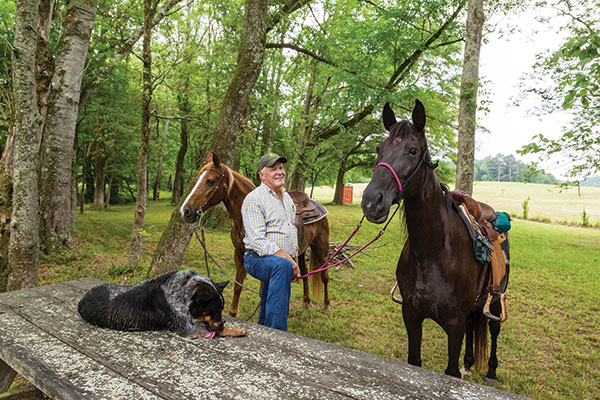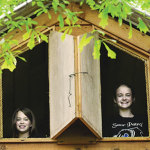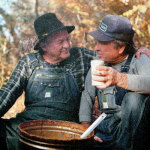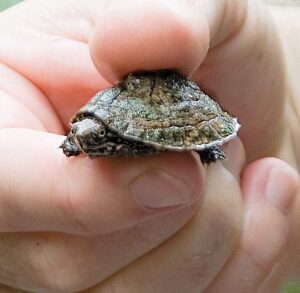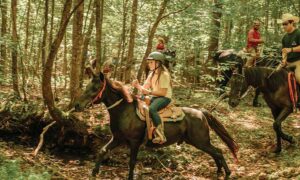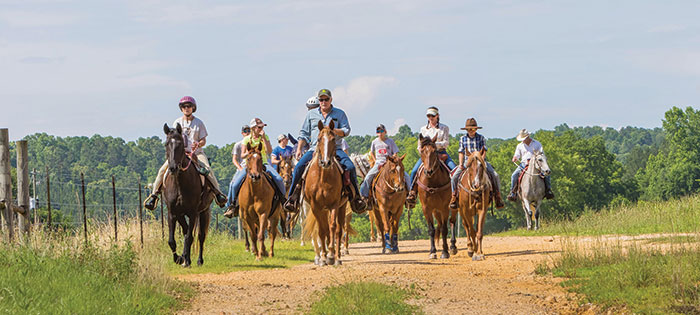
A world of cattle drives, scenic trails
Story by Elaine Hobson Miller
Photos by Mike Callahan
With the strains of “Rawhide” swelling inside their heads, 18 intrepid cowpokes slap their hands on their thighs, kick their horses and yell, “Head ‘em up, move ‘em out,” as they ride off to round up the herd.
“I’ve always wanted to say that,” one of the cowgirls remarks.
It’s all part of the annual cattle call at the Shel-Clair Farms, a 1,000-acre spread that straddles the borders of Shelby and St. Clair counties off U.S. 231 South. Owned by Ralph, Randy and Wayne Bearden, the farm and ranch is home to row crops, horse boarders, trails and fishin’ holes. It’s also home to 150 to 200 cows that have to be mustered for weaning, pregnancy checking and vaccinating every spring.
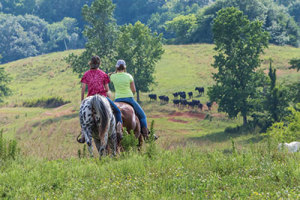 “I started the roundup in 2009 as a way to get the cows to the barn and have some fun at the same time,” says Randy Bearden, farm manager. “We skipped last year because someone got hurt in 2013. But we decided to try again this year.”
“I started the roundup in 2009 as a way to get the cows to the barn and have some fun at the same time,” says Randy Bearden, farm manager. “We skipped last year because someone got hurt in 2013. But we decided to try again this year.”
No one got hurt this year, and everyone seemed to have a great time. Twelve of the 18 riders were Shel-Clair boarders, who are accustomed to cantering among the cattle without incident. Rounding them up from the various fields and meadows and pushing them to the pasture near the old corn silo is another matter.
“Stay behind them, because they’ll turn the opposite way if you don’t,” Randy tells the group before it heads out one steamy Sunday afternoon in May. “Don’t run them, because some of them are pregnant.”
After these basic instructions, the weekend drovers take off in search of their hoofed subjects. Some of the cows are down in the hollows; others are in the woods cooling off. As soon as a few are spotted, the whooping and hollering begins.
“Woo-hoo, get on out of there, girls,” riders yell at the reluctant cows and calves. “Giddy-up, whoop whoop. Move along.” Once a few of the animals start moving, the others follow. A handful are insubordinate, however, and try their best to avoid the horses. They double back into the woods and stop in the streams to avoid capture, forcing mounted participants to split into teams to rally them.
During the three-hour event, riders pass an abandoned, barn-shaped house built during World War II that has almost been reclaimed by Mother Nature. They climb a ridge, where a bunch of folks watched Alabama play the University of Florida several years ago on a giant, flat-screen TV run by a gas generator. They stop briefly at the creek that was full of trout until the river otters ate them, then listen to cows bellowing from a nearby pasture. A slight breeze moves the tree leaves and tall weeds, making the humidity a little more bearable.
“The creek runs out of a spring where the water is crystal clear and never gets above 63 degrees,” Randy says. “It has a few bass and bream now.” The Beardens also have an 8-acre lake on the opposite side of the farm where they allow the public to fish for a fee.
It’s their day job and more
Randy cuts about 400 round bales and another 1,000 square bales of hay each year to feed the cows. If there is an abundance, he will sell some hay, but the herd uses most of it. The number of cows varies when some go to market or have babies. He tries to keep 150 mama cows and two bulls all the time. “Most cattle farms in the state have only 30 to 40 head,” he says. “But this is how I make my living. I don’t have an off-farm job.” He says the money he gets from leasing 110 acres for row crops pays the taxes.
He sells the cows at the Ashville Stockyard, and one obstreperous specimen is about to make that trip a trifle early if she keeps trying Randy’s patience. “That’s Number 36,” he says of the stubborn mama who insists on running away from the horses and the herd with her calf at her side. “She does this every year,” he adds, as disgusted as a mother who can’t control her toddler’s tantrums.
Randy’s family started farming in Shelby County in 1929 when J.E. “Ned” Bearden opened a dairy farm in Helena. Ned and his wife, Irene “Ma” Bearden, raised six children on that farm. Their son Ralph and Ralph’s sons, Randy and Wayne, started Shel-Clair Farms in 1972. Tired of getting up before dawn for milking or at 2 a.m. to repair a broken well pump, they closed their dairy business in 2005 and transitioned to a row-crop and beef-cattle operation. They added horse trails and boarding in 2007.
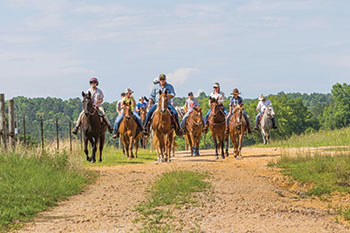 They have developed 12 miles of scenic trails that cover rolling hills, cross small creeks, ramble through forests and pass by a waterfall. The trails have names like Open Range, Ridge Mountain and Hurricane Mountain. The Haunted Swamp, part of the Hurricane trail, is so named because of the cow skulls hanging from trees and various bones scattered about. At least, that’s Randy’s story.
They have developed 12 miles of scenic trails that cover rolling hills, cross small creeks, ramble through forests and pass by a waterfall. The trails have names like Open Range, Ridge Mountain and Hurricane Mountain. The Haunted Swamp, part of the Hurricane trail, is so named because of the cow skulls hanging from trees and various bones scattered about. At least, that’s Randy’s story.
The trails are well-marked, unless the cows have knocked down some of the signs. Day riders, who are just as welcome as the boarders, can’t pass the farm’s Sycamore Sally without stopping for photos in the huge tree’s hollow trunk. That may change, though, because Randy found a snake inside the tree recently.
When he’s not rounding up cattle by horseback, Randy rides through the property in a red Ford pickup with a Blue Heeler named Blue on the bed’s tool box. Blue paces back and forth, trying to keep his balance. Randy says he has only fallen off once.
After the roundup, which took twice as long this spring as it normally does because some of the cows were less than cooperative, Randy treats riders to pizza and soft drinks at his new barn.
Sharon Jones of Leeds, one of the farm’s original boarders, is a veteran at the Bearden roundup. “I ride by myself a lot, so I really enjoy riding with a group,” she says, between bites of pizza. “It hypers my horse up, too, so he’s more fun to ride.” Madison Sharp, 18, a recent graduate of the Alabama School of Math and Science in Mobile, is another boarder who has done several roundups. “It’s fun,” she says. “It’s interesting to watch my horse think.”
It was Jackie Cockrell’s first roundup, and she brought along her 11-year-old son, Colton. “It was very exciting,” says Cockrell, who keeps their horses at her own farm in Leeds. “I would do it again next year.” Colton agrees. “Yeah, that was fun,” he says.
For more information about riding or fishing at
Shel-Clair, visit its website @ shelclairfarms.com











